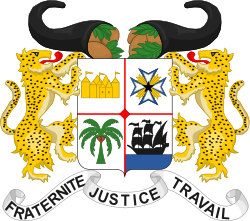| | ||||||||||||||||||||||||||||||||||||||||||||||
30 April 2011 | ||||||||||||||||||||||||||||||||||||||||||||||
All 83 seats in the National Assembly 42 seats needed for a majority | ||||||||||||||||||||||||||||||||||||||||||||||
| Turnout | 57.63% | |||||||||||||||||||||||||||||||||||||||||||||
|---|---|---|---|---|---|---|---|---|---|---|---|---|---|---|---|---|---|---|---|---|---|---|---|---|---|---|---|---|---|---|---|---|---|---|---|---|---|---|---|---|---|---|---|---|---|---|
This lists parties that won seats. See the complete results below. | ||||||||||||||||||||||||||||||||||||||||||||||
 |
|---|
| |
Parliamentary elections were held in Benin on 30 April 2011, after being delayed from 17 April 2011. [1] [2] Turnout was reportedly low. [3] The election saw a six-seat increase for the Cauri Forces for an Emerging Benin, composed of allies of the president Yayi Boni, which took nearly half the parliamentary seats. The election consolidated Boni's victory in the 2011 presidential elections the previous month; Adrien Houngbédji, the second-placed candidate, had rejected the validity of the presidential election results. [4]
